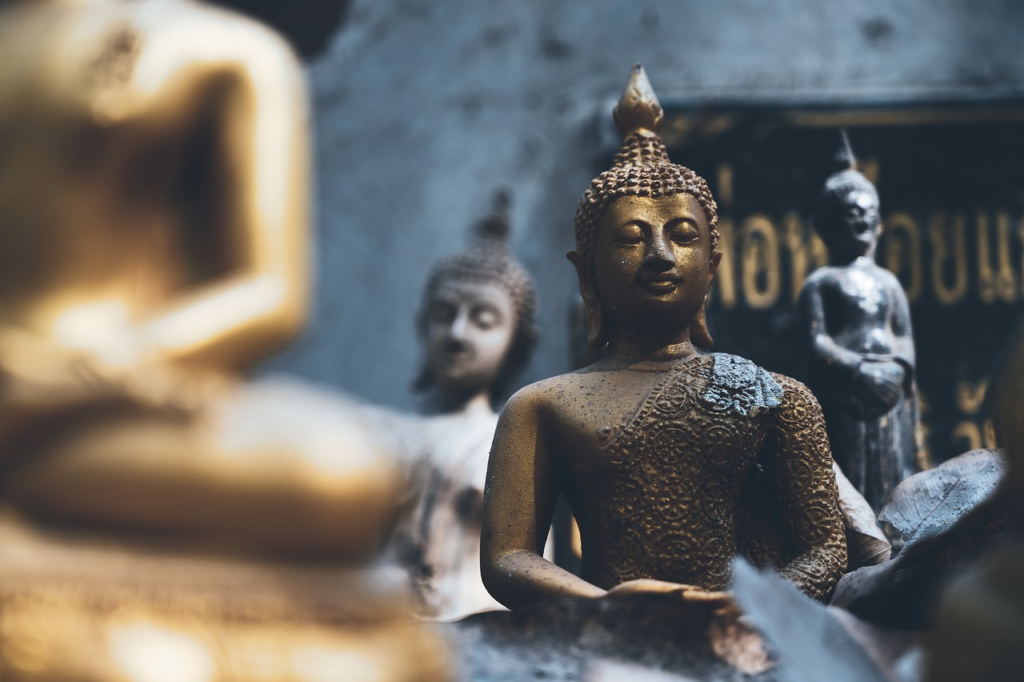Advertisement
Whether out of academic or spiritual interest or simply a quest for a broader understanding of the world, understanding the main global religions is essential. In this content, we'll explore the world's seven main religions, as well as some fascinating facts about each one.
What are the world's 7 main religions?
In a vast and diverse world, religion plays a central role in the lives of billions of people, shaping their beliefs, values and daily practices. As we explore the different religious traditions, we are taken on a fascinating journey through the complexities of human spirituality and the search for meaning.
Advertisement
1. Christianity
With more than 2 billion adherents worldwide, Christianity is the largest religion on the planet. Its history goes back more than two thousand years, beginning with the life and teachings of Jesus Christ, whose legacy continues to inspire and guide millions of believers to this day.
The journey of Christianity is marked by a rich tapestry of traditions, beliefs and practices that vary significantly between the different denominations and strands. From Roman Catholicism, with its rich liturgy and ecclesiastical hierarchy, to Protestantism, with its emphasis on personal interpretation of the Bible and salvation by faith, Christianity is home to an impressive diversity of expressions of faith.
Advertisement
Central to the Christian faith is the belief in the Trinity: the Father, the Son (Jesus Christ) and the Holy Spirit, three manifestations of a single divinity. The life and teachings of Jesus, recorded in the Gospels of the New Testament, are considered the cornerstone of the Christian faith, teaching love, forgiveness, compassion and redemption.
Beyond the theological aspects, Christianity has also played a crucial role in shaping Western history and culture. From the influence of the Catholic Church in medieval Europe to the contribution of Protestant reformers to the development of democracy and human rights, the impacts of Christianity can be seen in all spheres of society.
2. Islam
With more than 1.8 billion followers worldwide, Islam is the second largest religion on the globe. Founded in the 7th century on the Arabian Peninsula by the prophet Muhammad, Islam quickly spread, becoming a major religious and cultural force in vast regions of Africa, Asia and beyond.
Islam is based on the teachings of the Koran, considered the holy book of Muslims, which is believed to be the literal word of God revealed to Muhammad. In addition to the Koran, Muslims also follow the Hadiths, which are collections of traditions and teachings attributed to Muhammad.
One of the most distinctive features of Islam is the concept of strict monotheism, known as tawhid, which affirms belief in a single God, Allah. Submission to Allah is central to the practice of Islam, and Muslims are encouraged to obey divine commands in all areas of life, from daily prayer to social and political relations.
The Five Pillars of Islam represent the fundamental principles of the Muslim faith: Shahada (declaration of faith), Salat (prayer), Zakat (charity), Sawm (fasting during the holy month of Ramadan) and Hajj (pilgrimage to Mecca). These pillars serve as guides for a pious and upright life, shaping the practices and values of Muslims all over the world.
In addition to its religious practices, Islam also profoundly influenced culture, art, science and politics throughout the Islamic world. During the Islamic Golden Age, which took place between the 8th and 14th centuries, Muslims made important advances in areas such as medicine, mathematics, astronomy and philosophy, leaving a lasting legacy that influenced human civilization.
3. Hinduism
With a history dating back thousands of years, Hinduism is one of the world's oldest and most complex religions, with approximately 1.2 billion followers, mainly in India and Nepal. This spiritual tradition embraces a diverse range of beliefs, practices and rituals, reflecting the rich cultural and philosophical tapestry of the Indian subcontinent.
Unlike many other religions, Hinduism does not have a single founder or central authority, but rather a collection of ancient texts known as the Vedas, Upanishads and the epics Mahabharata and Ramayana, which serve as sources of teaching and spiritual inspiration. These texts deal with a wide variety of topics, from morality and ethics to cosmology and the nature of reality.
One of the most distinctive features of Hinduism is the belief in reincarnation and karma, which holds that a person's actions in one life affect their destiny in future lives. This notion of the cycle of birth, death and rebirth is central to Hinduism's understanding of human existence, encouraging followers to seek liberation (moksha) from the cycle of rebirths through spiritual seeking and personal fulfillment.
In addition, Hinduism is known for its rich panoply of deities, each representing different aspects of the divine. From Brahma, the creator of the universe, to Vishnu, the preserver, and Shiva, the destroyer and renovator, Hindu gods and goddesses embody a variety of qualities and attributes, reflecting the diversity and complexity of the cosmos.
Rituals and religious practices play a fundamental role in the daily lives of Hindus, from worship in temples to colorful festivals celebrating different deities and religious events. Puja (worship), meditation, yoga and the study of sacred texts are just some of the ways in which Hindus seek to cultivate a deeper connection with the divine and find meaning in their lives.
4. Buddhism
With a base of over 520 million followers worldwide, Buddhism is one of the world's major religions, whose influence spans centuries and continents. Originating in India in the 6th century BC as a reaction to the religious practices of the time, Buddhism was founded by Siddhartha Gautama, known as the Buddha, who sought answers to human suffering and the nature of existence.

Buddhism is based on the Four Noble Truths and the Noble Eightfold Path, fundamental teachings that form the structure of the Buddhist faith. The Four Noble Truths state that life is characterized by suffering (dukkha), that suffering has a cause (desire), that it is possible to cease suffering and that there is a path to achieve liberation from suffering, known as the Noble Eightfold Path. This path involves developing wisdom, ethical conduct and mental concentration.
One of the distinctive features of Buddhism is the practice of meditation, which plays a central role in the quest for enlightenment. Through meditation, practitioners seek to develop mindfulness and concentration, as well as to investigate the nature of mind and reality.
Buddhism is a diverse religious tradition, with different schools and traditions that have emerged over the centuries and in different regions of the world. The main schools include Theravada Buddhism, which emphasizes the search for individual enlightenment through personal practice; Mahayana Buddhism, which emphasizes compassion and the search for enlightenment to benefit all sentient beings; and Vajrayana Buddhism, which incorporates advanced meditation practices and tantric rituals.
5. Sikhism
Sikhism is a monotheistic religion founded in India in the 15th century by Guru Nanak Dev Ji, a visionary and spiritual leader. Emerging at a time of religious and social turmoil in India, Sikhism sought to transcend sectarian divisions and promote unity among all people, regardless of their caste, religion or social status.
One of the central beliefs of Sikhism is the belief in one God, known as Waheguru or Akal Purakh, who is considered the creator and maintainer of the universe. Sikhs believe in the importance of devotion to God and in practicing community service and social justice as expressions of their faith.
Guru Nanak taught the principles of Naam Simran (remembrance of God), Vand Chakna (sharing with the needy) and Kirat Karni (earning an honest living) as the basis of Sikh life. These principles reflect the Sikhs' commitment to compassion, equality and social responsibility.
One of the most distinctive aspects of Sikhism is its emphasis on the equality of all human beings, regardless of their ethnic origin, gender or social class. Sikhs reject the caste system and believe in the equality of all human beings before God. This is symbolized by the practice of langar, where all people, regardless of their origin, are welcome to participate in a free communal meal in gurdwaras (Sikh temples).
The Guru Granth Sahib, the holy book of the Sikhs, is considered the final authority on spiritual and practical matters. It contains hymns and teachings from various Sikh gurus, as well as saints and sages from different religious traditions.
6. Judaism
Judaism is one of the oldest and most influential religions in the world, with a history dating back thousands of years. Its origins lie in the ancient religious traditions of the Hebrew people, whose history is recorded in the Holy Scriptures of the Tanakh, which corresponds to the Old Testament of the Christian Bible.
Central to the Jewish faith is the belief in a single, transcendent God, who made a covenant with the people of Israel. This covenant is described in the Torah, which includes the five books of Moses (Genesis, Exodus, Leviticus, Numbers and Deuteronomy), and forms the basis of Jewish law and ethics.
Judaism is a diverse religious tradition with a wide range of beliefs, practices and interpretations. The main streams of Judaism include Orthodox Judaism, which emphasizes strict adherence to Jewish law and tradition; Conservative Judaism, which seeks to balance traditional observance with adaptation to modern needs; and Reform Judaism, which emphasizes individual freedom and adaptation to cultural change.
In addition to its theological beliefs, Judaism is also a tradition rich in ritual and ceremonial practices. From the weekly Shabbat (day of rest) to religious festivals such as Pesach (Jewish Passover), Sukkot (Feast of Tabernacles) and Yom Kippur (Day of Forgiveness), Jews practice a series of rituals that recall historical events and express their spiritual and cultural identity.
7. Religions of African Origin
African-based religions comprise a variety of spiritual traditions deeply rooted in the cultures and histories of African peoples. These religions have their own beliefs, rituals and practices that reflect the ethnic and geographical diversity of the African continent.
Candomblé (Brazil)
Originally from the West African region, Candomblé was brought to Brazil during the period of slavery. It combines elements of the Yoruba, Fon and Bantu religions with indigenous and Catholic influences. Candomblé practitioners worship deities known as orixás, each representing specific aspects of nature and human life.
Santería (Cuba)
Santería is an Afro-Cuban religion that developed from the religious traditions brought to Cuba by enslaved Africans. It mixes elements of the Yoruba religion with Roman Catholicism. Santería practitioners worship the orishas and often perform ritual ceremonies to connect with these deities.
Voodoo (Haiti)
Voodoo is a religion practiced in Haiti and other parts of the Caribbean, influenced by the spiritual traditions of African peoples, mainly from the ancient Kingdom of Dahomey (now Benin). Voodoo practitioners believe in a supreme deity, Bondye, and worship spirits called loas, who act as intermediaries between humans and the divine.
Ifá (Nigeria)
Ifá is a system of divination and a religion practiced by the Yoruba people in Nigeria and other parts of West Africa. It is based on the teachings of the orishas and the cult of the ancestors. Ifá priests, known as babalawos, interpret the sacred verses of the Ifá Oracle to guide the faithful in matters of life, health and destiny.
Egungun (West Africa)
Egungun is a religious tradition found in several West African cultures, including Yoruba, Ewe, Fon and Igbo. It centers on the worship of ancestors and the belief in the continuity of life after death. Egungun practitioners perform dances and rituals to honor and connect with the spirits of the ancestors.
These are just a few of the many African-based religions that continue to play an important role in the lives and communities of African peoples and their descendants around the world. Their deep and rich spiritual traditions offer a unique vision of the divine and of human life, enriching the global religious landscape with their diversity and depth.
See also: The Importance of Spirituality in the Digital Age: How Technology Affects Our Religious Practice
March 30th, 2024

She has a degree in Languages - Portuguese/English, and is the creator of the Escritora de Sucesso website. As a writer, she seeks to expand everyone's knowledge with relevant information on various subjects. At SoMuchToSayToday, she brings news and content ranging from entertainment to the country's economic situation.



